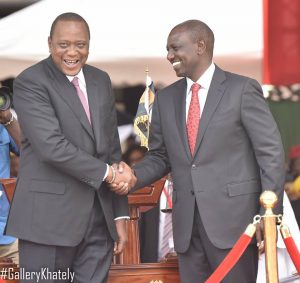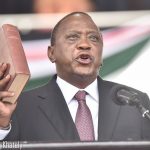The Guardian – Police Used Teargas On Our Children, But For Now We Celebrate …
By Boniface Mwangi
On Monday, I was among a small group of concerned Kenyan citizens and former students who headed to Langata Road primary school in Nairobi to join a peaceful protest against attempts by a developer to seize the school playground.
The idea was to join the pupils on their first day back at school to reclaim the grabbed land through games and football. Appropriately and somewhat poignantly in view of what happened, Monday was Martin Luther King Day.
The Lang’ata School serves the neighbouring Kibera slum – one of Africa’s biggest informal settlements – and also the children of wardens from a nearby prison.
The playground was “grabbed” during the December school holidays and the contractor hired goons to guard construction workers as they hurriedly erected a perimeter wall. This denied the children access to their play area. When the school’s head teacher learned of the seizure, he reported the matter to Lang’ata police station, but no action was taken and the private developer continued to construct the wall.
When we arrived at the school on Monday, we found armed police, some in riot gear, surrounding the playground. What happened next has been beamed around the world, and here in Kenya has sparked a timely debate about the all-too-common process of land grabbing by powerful personalities in our country.
At break time, the children trooped towards the playground. But because there was now a wall in their way, they had to try to get in through a gate along the busy, nearby highway. The children carried twigs as a sign of peace because Kenyan police are notorious for brutally dispersing people.
The police refused to allow the children into the playground so the youngsters started singing Haki Yetu (“It’s our right” in Kiswahili), while banging on the gate. Their teachers and a few parents were directly behind the pupils.
Suddenly there was a loud bang as teargas canisters exploded at the feet of the singing pupils. Everyone stampeded away. A few children were hurt while trying to escape and others fell into a roadside ditch. There were loud screams and some children called for their mothers as they choked on the gas.
The children were rushed back into the school compound where teachers, former students and parents offered help. Students with more severe injuries were rushed to hospital by good Samaritans. One girl is still in hospital.
After the situation calmed a little, the children regrouped and, with their teachers, started to demolish the wall blocking access to the playground. One side of the wall soon came tumbling down, and some of the children ran into the playground. They kicked balls and enjoyed traditional games. But then the police charged, and attempted to arrest some of the activists.
More police arrived with dogs but the pupils were undeterred and continued chanting, “Shame! Shame! It’s our field”. The police insisted the playground was private property, and ordered the children to leave. More teargas was fired, and emotions reached boiling point. Someone threw a stone at a police officer, injuring him. We tried to get that person arrested but he escaped.
The back-and-forth continued. More of the wall came down. Two people, an activist and a photo-journalist, were detained.
The use of teargas and dogs to respond to a peaceful effort to reclaim property rightfully belonging to the school was an unfortunate blight on the triumph of the day. It was unnecessary, and innocent children were hurt by the security forces’ reckless response.
Children know an injustice when they see one and they react, as we all do, with a demand for justice. I firmly believe the children got that justice. Kenya’s interior minister, Joseph Ole Nkaissery, visited the school on Tuesday and apologised to the pupils.
Nkaissery gave the developer 24 hours to clear the land. President Uhuru Kenyatta has described the incident as deplorable. While that is commendable, it is not enough because we do not yet know who the powerful landgrabber is. It’s not likely he will be named if there is no prosecution.
Kenyan police will not stop using excessive force against demonstrators unless there are serious public consequences for those involved in the heavy-handed response.
A report last year by an education taskforce showed that 46 schools in Nairobi have reported a lack of clarity with regard to their boundaries. Out of every 10 schools visited, at least one had seen encroachment by private developers, religious organisations or illegal settlements.
For now, we celebrate the win. The children have their playground back and, if the statement from the president holds true, this important space will never be seized again. The greedy grabber will, without a doubt, move on to the next school but we shall be waiting for him there too.
#OccupyPlayGround was still trending on Twitter on Tuesday. This action has been a reminder to us all that we can reclaim what has been taken away from us so long as we are willing to be courageous enough to stand up for it.
This article first appeared on The Guardian’s Global Development section.




